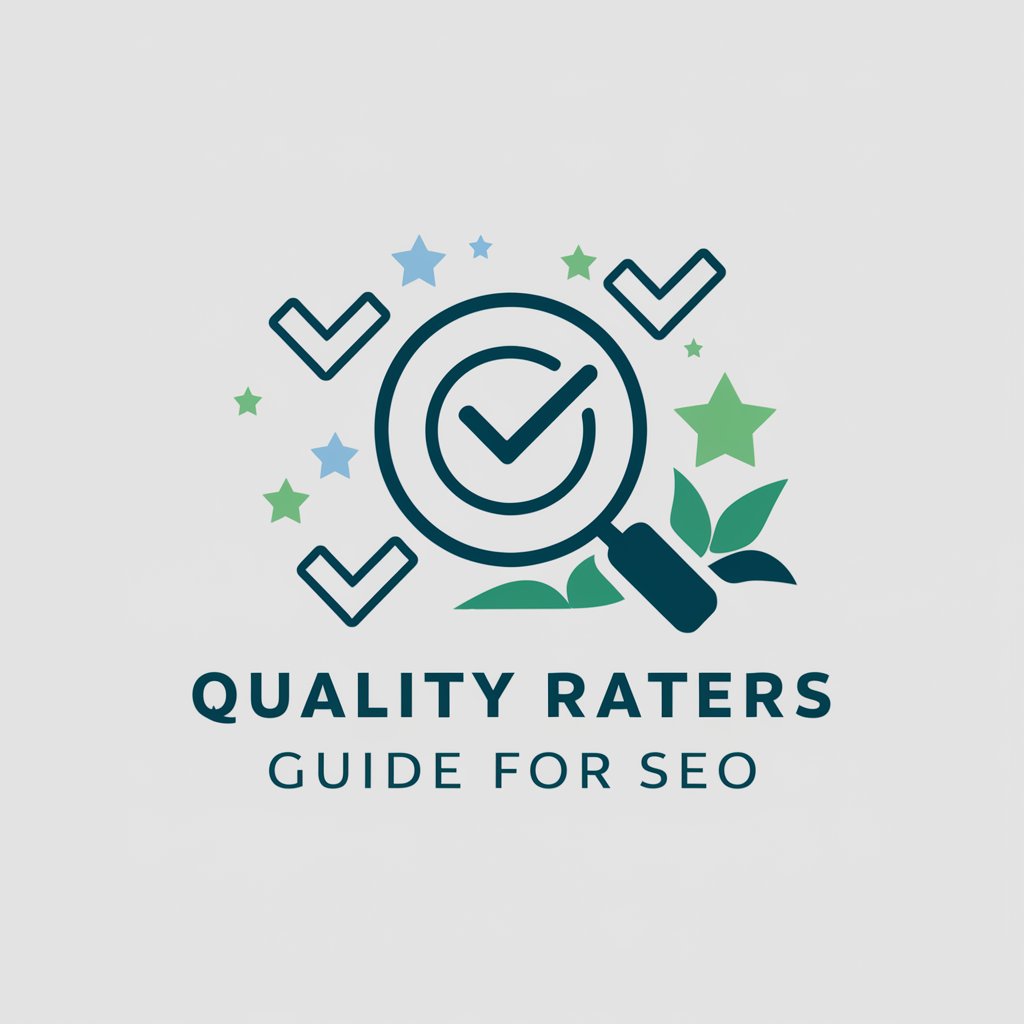Quality Raters Guide for SEO - SEO Guidance Tool

Welcome to the Quality Raters Guide for SEO!
Empower Your SEO with AI-Driven Insights
Describe the purpose of search quality rating.
Explain the importance of E-E-A-T in content evaluation.
What are YMYL topics, and why are they significant?
How do search quality guidelines impact web content?
Get Embed Code
Introduction to Quality Raters Guide for SEO
The Quality Raters Guide for SEO is designed to assist in understanding how search quality rating is performed and its significance in improving search engine results. It offers a comprehensive overview of the criteria and methodologies used by quality raters to evaluate web pages and search results. The guidelines serve as a manual for raters, providing insights into assessing the usefulness, reliability, and overall quality of information presented online. For example, raters are instructed to consider aspects such as the purpose of a page, the expertise, authoritativeness, and trustworthiness (E-A-T) of the content, and the quality of the user experience. Powered by ChatGPT-4o。

Main Functions of Quality Raters Guide for SEO
Guidance on Page Quality Rating
Example
Evaluating the E-A-T of web pages.
Scenario
Raters assess the expertise of the content creator, the authoritativeness of the website and content, and the trustworthiness of the site and its content to provide accurate, reliable information.
Assessment of Needs Met Rating
Example
Determining how well a page meets the user's search query.
Scenario
Raters evaluate whether a web page provides the information or service sought by the user effectively and satisfactorily, considering the user's intent and context of the search.
Ideal Users of Quality Raters Guide for SEO Services
SEO Professionals
SEO experts and digital marketers can use the guidelines to understand Google's perspective on high-quality content, aiding them in optimizing web pages to align with these quality standards.
Content Creators
Writers, bloggers, and content producers can leverage the guide to craft content that meets the quality expectations of search engines, thereby improving their visibility and ranking.

How to Utilize the Quality Raters Guide for SEO
Begin Your Journey
Start by visiting a leading AI platform that offers a rich suite of tools for enhancing your digital presence, accessible without the need for a premium subscription.
Understand the Guidelines
Familiarize yourself with the Quality Raters Guidelines, focusing on the key concepts of E-A-T (Expertise, Authoritativeness, Trustworthiness) and Page Quality rating.
Analyze Your Content
Assess your website's content against the guidelines, paying special attention to the quality of information, source credibility, and user experience.
Implement Improvements
Apply the insights gained to enhance your content's relevance, authority, and trustworthiness, thereby optimizing it for both users and search engines.
Monitor and Adjust
Regularly review your SEO performance and make adjustments based on the latest guidelines and search engine updates to maintain and improve your rankings.
Try other advanced and practical GPTs
PhiliBuzz
Stay Informed with AI-Powered Philippine News

新闻题目编辑
Elevating News with AI-Powered Headlines

減肥專家
AI-Powered Personal Weight Loss Coach

Multilingual Brand Polisher
Polishing Brand Content with AI

Read Paper
Streamlining Academic Research with AI

Romantic Pixel Muse
Craft Your Love Story with AI-Powered Pixel Art

SEO Focus
Elevate Your Online Presence with AI

Dropship Advisor
AI-powered Dropshipping Insights

✨💖🐶~~拉拉的神秘塔羅~~🐶💖✨
Unlock spiritual insights with AI-powered tarot

Waytrio
Craft Your Journey with AI

ASO writer
Elevate Your App with AI-Powered ASO

MJ v6 GPT Prompt Generator
Crafting Your Ideas into AI-Powered Prompts

Detailed Q&A about Quality Raters Guide for SEO
What is the Quality Raters Guide for SEO?
It's a document used by search engine evaluators to assess the quality of web pages and the relevance of search results. While not a direct ranking factor, it provides insights into what search engines consider high-quality content.
How does the E-A-T principle affect SEO?
E-A-T stands for Expertise, Authoritativeness, and Trustworthiness. High E-A-T content is likely to rank better because it signals to search engines that the content is valuable, reliable, and created by knowledgeable sources.
Can small websites compete with larger ones in terms of E-A-T?
Yes, small websites can compete by focusing on niche subjects where they can demonstrate clear expertise, authority, and trustworthiness, even surpassing larger, less-focused sites.
How often should I review my site against the Quality Raters Guidelines?
Regular reviews are recommended, especially after major content updates, site redesigns, or significant changes in search engine algorithms to ensure ongoing compliance and performance.
Are the Quality Raters Guidelines publicly available?
Yes, these guidelines are periodically released by search engines to help webmasters understand what constitutes high-quality content and how search quality is assessed.
